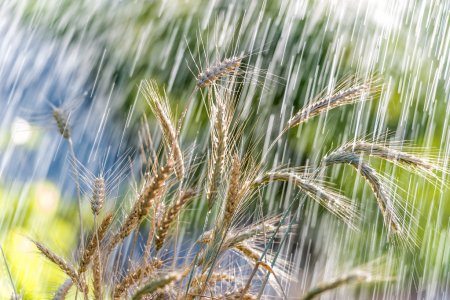וְתֵן טַל וּמָטָר לִבְרָכָה (ברכה) עַל פְּנֵי הָאֲדָמָה וְשבְּעֵנוּ מִטּוּבָהּ/מִטּוּבך… ברוך אתה ה’ מברך השנים/V’ten tal u’matar livrakha al p’nei ha’adam, v’sab’enu mituva (or mituvekha). … Barukh Atah Adonay, mevarekh hashanim. Grant dew and rain as a blessing upon the earth (during winter and spring – or just “grant blessing,” during summer and fall) and satisfy us from its goodness (or alternatively “from Your goodness”)… Blessed are You who blesses the years.
The next blessing in the Amidah petitions God for agricultural prosperity. We in the developed world take for granted that there will always be food in the stores. The poorest among us worry they cannot afford food but rely on the grocery being stocked when they have the cash. (The disjunction between societal prosperity and personal poverty is its own particularly cruel suffering.)
People in ancient Israel had no such confidence. Rain meant food. No rain meant famine. Naturally, they prayed fervently for rain, as is evident in this blessing, as well as in an elaborate system of fasting and supplicating during droughts, which you can read about in the Talmud’s Tractate Taanit.
Perhaps in the coming age of climate change, today’s confidence will vanish and global hunger will return, as we struggle with famines like those that plagued certain African and Asian countries, as we older folks remember.
Of course, today it is implausible to beseech God to please futz with the weather. That’s not how rain works.
But it remains possible to davven this blessing with a full heart, as a meditation on anxiety for the future. We all still wonder what awaits us, and all hope for good fortune. I can imagine this blessing striking home for someone hoping for the birth of a child, seeking a job, finding love or starting college. May You bless this year like one of the very best years, a person might davven. And saying this paragraph might cultivate in us our reservoirs of hope and gratitude.
This 9th blessing of the Amidah is notable for being the most variable section of the prayer. The Ashkenazi and some Sefaradi versions have a small variation based on the time of year. In the rainy season – beginning on Heshvan 7 in Israel or December 4 (about two months after the autumnal equinox) outside the land until the 2nd day of Passover – one petitions for “rain and dew as a blessing upon the earth.” In the rest of the year, one requests only “blessing upon the earth,” since summer rain just wasn’t likely to happen, at least not in the Land of Israel. In some Sefaradi or Mizrahi versions, the seasonal variation is much greater. After Passover, some substitute an entirely different version of this blessing: “Bless us … in all the work of our hands this year … and may it result in life, satisfaction and peace … Blessed are You who blesses the years.“
Another minor variation catches my eye, and perhaps affects how you might davven. This particular phrasing is neither Ashkenazic nor Sefaradic nor Mizrahi, as each tradition displays examples of both variants. Some versions read: grant dew and rain as blessings upon the earth and satisfy us from its goodness, or sab’enu mituvah. That makes syntactical sense, as well as naturalistic sense: rain feeds the earth, the earth feeds the people. Other versions place a semi-colon in the previous sentence, and have the davvener turn directly to God: grant rain and dew on the earth; satisfy us from Your goodness, or sab’enu mitvekha.
Each version has its partisans. Neither one is right or wrong. Like most Siddur phrases, it alludes to Bible verses, but is not an exact quotation. (Examples: Psalms 65:5, “let us be satisfied in the goodness of Your house,” or Nehemiah 9:25, “They ate, were satisfied, grew fat and delighted in Your great goodness.”) Following R. Isaac Luria, Kabbalists prefer the version mituvah, “from its goodness,” because the final letter in each word of the phrase penei ha’adamah v’sab’enu mituvah spell out YHVH, the divine Name.
Myself, I prefer mituvekha, from Your goodness. My spiritual inclination is to trace all blessings to God, the fountain from which all blessings flow. To seek the earth’s blessing sounds a little narrow to me: true berakhah doesn’t come from the field or the tree, it comes from the Boreh Olam, the One who creates the tree. I want to turn directly to God when I davven.
But I can imagine that davveners who like a little more nature-wonder in their prayer will respond better to the version seeking the earth’s blessing as a channel for divine grace. It’s a moment of kosher paganism, a holy and/or of blessing God through creation.
Either way, I wish for us all that this year is blessed like one the very best years, with rain and dew, satisfaction, bounty and peace.





